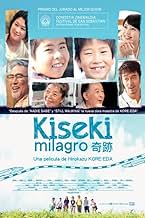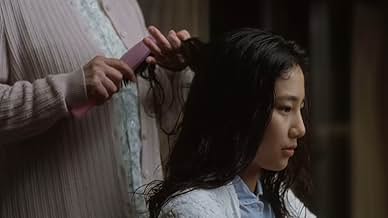AVALIAÇÃO DA IMDb
7,3/10
8,3 mil
SUA AVALIAÇÃO
Adicionar um enredo no seu idiomaTwelve-year-old Koichi, who has been separated from his brother Ryunosuke due to his parents' divorce, hears a rumor that the new bullet trains will precipitate a wish-granting miracle when ... Ler tudoTwelve-year-old Koichi, who has been separated from his brother Ryunosuke due to his parents' divorce, hears a rumor that the new bullet trains will precipitate a wish-granting miracle when they pass each other at top speed.Twelve-year-old Koichi, who has been separated from his brother Ryunosuke due to his parents' divorce, hears a rumor that the new bullet trains will precipitate a wish-granting miracle when they pass each other at top speed.
- Prêmios
- 5 vitórias e 9 indicações no total
Kôki Maeda
- Koichi
- (as Koki Maeda)
Ôshirô Maeda
- Ryunosuke
- (as Oshiro Maeda)
Nene Ôtsuka
- Nozomi (Mother)
- (as Nene Ohtsuka)
Avaliações em destaque
Lighthearted but profound Japanese family drama about two young brothers forced to live apart after the separation of their parents. The more sensitive Koichi (Koki Maeda) lives with his mother and grandparents in Kagoshima under the shadow of the active Sakurajima volcano, while the happy-go-lucky Ryu (Ohshirô Maeda) has remained in Fukuoka with their slacker musician father. Koichi longs for them to be reunited and when he hears of a magical rumour that when two super-fast Bullet trains pass each other they create enough cosmic energy to grant your wish, he and his friends set out to put things back the way they were.
The suburban tale of a troubled family told with a touch of fantasy and adventure draws obvious parallels with Spielberg, and it is more than worthy of the comparison. Director Hirokazu Koreeda elicits two incredibly natural performances from the boys (real life brothers) and indeed all of the young cast – in the scenes where they're hanging out he has seemingly turned the camera on some local school friends, their relationships seem so genuine. Koichi and Ryu's story is interspersed with those of their friends and family, all of whom have their own struggles and aspirations. Be it their grandfather's desire to bake a successful sponge cake, or Koichi's friend's dream of marrying the beautiful school librarian, every character – no matter how minor – is portrayed as a real person with their own hopes and fears. As a result it is constantly engrossing, establishing an affinity with everyone on screen and also allowing some fantastically warm funny moments to emerge from the characters themselves. Despite its concentration on character over narrative, and its general unpredictability, the film still has a mainstream tone and is more than capable of cultivating a wide, varied audience.
A quiet natural film that avoids obvious melodrama and sentimentality, it retains a thoughtful depth about what it is to dream and hope for that which is just out of reach. As is often the case with the most affecting cinema its power lies in what the viewer brings to it from their own lives, and how much they are willing to invest in the film. With no obvious moral or message, it has the potential to be interpreted in many ways. A philosophical yet thoroughly accessible film that effortlessly gets under the skin.
The suburban tale of a troubled family told with a touch of fantasy and adventure draws obvious parallels with Spielberg, and it is more than worthy of the comparison. Director Hirokazu Koreeda elicits two incredibly natural performances from the boys (real life brothers) and indeed all of the young cast – in the scenes where they're hanging out he has seemingly turned the camera on some local school friends, their relationships seem so genuine. Koichi and Ryu's story is interspersed with those of their friends and family, all of whom have their own struggles and aspirations. Be it their grandfather's desire to bake a successful sponge cake, or Koichi's friend's dream of marrying the beautiful school librarian, every character – no matter how minor – is portrayed as a real person with their own hopes and fears. As a result it is constantly engrossing, establishing an affinity with everyone on screen and also allowing some fantastically warm funny moments to emerge from the characters themselves. Despite its concentration on character over narrative, and its general unpredictability, the film still has a mainstream tone and is more than capable of cultivating a wide, varied audience.
A quiet natural film that avoids obvious melodrama and sentimentality, it retains a thoughtful depth about what it is to dream and hope for that which is just out of reach. As is often the case with the most affecting cinema its power lies in what the viewer brings to it from their own lives, and how much they are willing to invest in the film. With no obvious moral or message, it has the potential to be interpreted in many ways. A philosophical yet thoroughly accessible film that effortlessly gets under the skin.
Kouichi (Kouki Maeda) and Ryunosuke (Oushiro Maeda) who's parents are separated and now lives apart in Fukuoka, and Kagoshima hears about a rumor that if you see the meeting of the first bullet trains from Fukuoka and Kagoshima, a miracle will happen. Wishing that the miracle will be the reunion of their parents, they set out to see the meeting of the two trains, while involving their friends, teachers, and adults around them.
Child prodigy stand up comic team Maeda-Maeda performs the role of Kouichi, and Ryunosuke. Director Hirokazu Koreeda originally had a different plot for the story, where a girl living in Fukuoka, goes to see the two trains crossing each other on the track, meets a boy from Hakata and love story ensues. But upon seeing Maeda-Maeda at the audition, he changed the story to that which involves the two brothers. The project was a promotional campaign for the opening of the Kagoshima route of Japan Railways bullet train line. They brought the project to director Koreeda, and he accepted.
Very common story that involves nothing but the life of few children, but is made extraordinary by the direction of Koreeda, and the performance of Maeda brothers. Observation of people in common life, and attention to detail is extraordinary, and can only come from the eyes of a genius. I can see why Koreeda is regarded so highly as a director. I'd say only few directors can take a theme like this, and create a truly intriguing movie like this one.
In reality it is virtually impossible to pinpoint where the two trains will meet on the track, so the story is purely fictional.
It may be difficult to see all the inner workings of this movie at a first glance, but it is worth the time to sit in and really enjoy the performance.
Child prodigy stand up comic team Maeda-Maeda performs the role of Kouichi, and Ryunosuke. Director Hirokazu Koreeda originally had a different plot for the story, where a girl living in Fukuoka, goes to see the two trains crossing each other on the track, meets a boy from Hakata and love story ensues. But upon seeing Maeda-Maeda at the audition, he changed the story to that which involves the two brothers. The project was a promotional campaign for the opening of the Kagoshima route of Japan Railways bullet train line. They brought the project to director Koreeda, and he accepted.
Very common story that involves nothing but the life of few children, but is made extraordinary by the direction of Koreeda, and the performance of Maeda brothers. Observation of people in common life, and attention to detail is extraordinary, and can only come from the eyes of a genius. I can see why Koreeda is regarded so highly as a director. I'd say only few directors can take a theme like this, and create a truly intriguing movie like this one.
In reality it is virtually impossible to pinpoint where the two trains will meet on the track, so the story is purely fictional.
It may be difficult to see all the inner workings of this movie at a first glance, but it is worth the time to sit in and really enjoy the performance.
Two young brothers, Kouichi and Ryuunosuke live apart in Fukuoka and Kagosima because of there parent's divorce. One day they know about a rumour that the person who sees the two new bullet trains passing each other for the first time gains his dream, and they plans to see it to make their wish to live together with their family again. With few friends of them, they goes to their meeting point. This film is very nice. We can see two brother's strong wish and their grow up in their spirits through the trip clearly. However, if I could say one thing, I want to see more about their past, or their life with their parent after they live apart. I could see their desire to live with their family again, but I could not see much trouble or conflict. However other than this, I think this film is very good and moving film.
Siblings try to find a way out of the circumstances imposed on them by their parents. Their lives are turned upside down when their parents divorce and custody arrangements split them up. Twelve-year-old Koichi ends up with his mother Nozomi, and they move in with her parents in a small village where she gets a job at a supermarket. Koichi's younger brother Ryunosuke, meanwhile, moves in with his dad Kenji, a struggling musician who can't hold on to a day job. The brothers miss each other and want to bring their parents back together, and when they hear of an urban legend that if two people make the same wish at the same time while watching two bullet trains pass one another, the wish will immediately come true, they decide this is the way to reunite the family.
It has its funny moments and it reminds you of your childhood (if you are more that 25 years old haha). The concept idea is a good one and the performance its quite good too. I was expecting way more to say the true, but everyone has its own tastes. Worth watching? 1 time, yes.
It has its funny moments and it reminds you of your childhood (if you are more that 25 years old haha). The concept idea is a good one and the performance its quite good too. I was expecting way more to say the true, but everyone has its own tastes. Worth watching? 1 time, yes.
This is the story of two young Japanese brothers who live apart following the break-up of their parents' relationship. The older boy dreams of his family reuniting and prays for a miraculous intervention in the form of a volcanic eruption, hoping this might lead to his evacuation from his grandparents' region and a return home. Then, when he discovers that the passing of the speeding Bullet trains, approaching from opposite directions, creates a 'cosmic' moment during which wishes are granted, he sets out with a few friends to meet his brother at the meeting point on the railway line. There they make their wishes - with varying results.
The two brothers are forced to deal with the consequences of their parents' choices, ones they have had no part in making. Their belief, to varying degrees, in the power of 'faith' (believing that wishes can come true) then leads them to have to face the consequences of their own choices. Given their youthful immaturity, there is real poignancy in witnessing their confrontation with some harsh realities.
The movie features brilliant performances from the young actors and an excellent supporting cast of adults. There is also gorgeous and evocative cinematography, scenes of the Japanese countryside and its urban impositions, not least the Bullet line itself elevated on its concrete trackbed.
It takes some time, too long perhaps, for the story to gain momentum. But once the youngsters embark on their journey to meet the trains, the story moves at a brisker, more engaging pace. The climax (yes there is a climax, contrary to the view of another reviewer) brings moments of intense beauty and sharp sadness, regret for the loss of childish innocence of as well as optimism in the hope for a better future.
So this is a slow-burner, but persistence brings rewards. Recommended.
(Viewed at The Cornerhouse, Manchester, UK 21.02.13)
The two brothers are forced to deal with the consequences of their parents' choices, ones they have had no part in making. Their belief, to varying degrees, in the power of 'faith' (believing that wishes can come true) then leads them to have to face the consequences of their own choices. Given their youthful immaturity, there is real poignancy in witnessing their confrontation with some harsh realities.
The movie features brilliant performances from the young actors and an excellent supporting cast of adults. There is also gorgeous and evocative cinematography, scenes of the Japanese countryside and its urban impositions, not least the Bullet line itself elevated on its concrete trackbed.
It takes some time, too long perhaps, for the story to gain momentum. But once the youngsters embark on their journey to meet the trains, the story moves at a brisker, more engaging pace. The climax (yes there is a climax, contrary to the view of another reviewer) brings moments of intense beauty and sharp sadness, regret for the loss of childish innocence of as well as optimism in the hope for a better future.
So this is a slow-burner, but persistence brings rewards. Recommended.
(Viewed at The Cornerhouse, Manchester, UK 21.02.13)
Você sabia?
- CuriosidadesShinkansen wanted to make a movie to promote their bullettrains. They approached Koreeda, an avid trainlover. He came up with this movie.
- ConexõesFeatured in A Story of Children and Film (2013)
- Trilhas sonorasKAGOSHIMA OHARA BUSHI
Written by Quruli
Performed by Quruli
Principais escolhas
Faça login para avaliar e ver a lista de recomendações personalizadas
- How long is I Wish?Fornecido pela Alexa
Detalhes
- Data de lançamento
- País de origem
- Centrais de atendimento oficiais
- Idioma
- Também conhecido como
- I Wish
- Locações de filme
- Empresas de produção
- Consulte mais créditos da empresa na IMDbPro
Bilheteria
- Faturamento bruto nos EUA e Canadá
- US$ 145.808
- Fim de semana de estreia nos EUA e Canadá
- US$ 10.919
- 13 de mai. de 2012
- Faturamento bruto mundial
- US$ 2.371.548
- Tempo de duração
- 2 h 8 min(128 min)
- Cor
- Mixagem de som
- Proporção
- 1.85 : 1
Contribua para esta página
Sugerir uma alteração ou adicionar conteúdo ausente




















